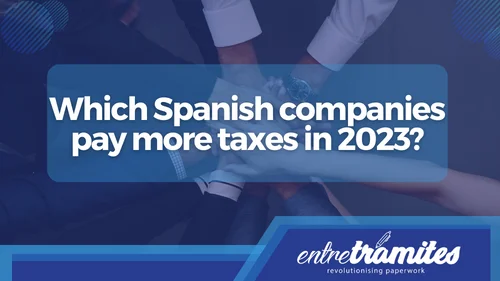Taxes are a necessary part of doing business in any country, but the vast majority of taxpayers are unaware of exactly how high they can be for some Spanish companies. In 2023, the number of taxes and their types vary from one company to another, depending on their size and nature.
Using official data from the Tax Agency
The Spanish Tax Agency (AEAT) collects data related to the taxes of Spanish companies every year. From this data, they are able to generate reports showing which types of businesses are paying the highest taxes in a given year. According to the latest official data, the average effective corporate tax rate in Spain was around 17% in 2017.
Micro, small and medium-sized Spanish companies
Companies that are classified as micro companies, meaning they have fewer than 10 employees, pay an effective tax rate of 14.8% in 2023. Similarly, small businesses, which employ between 10 and 50 people, have an effective tax rate of 18.8%. Medium-sized companies, which employ between 50 and 250 workers, have an effective tax rate of 13.7%. Larger companies, those with more than 250 employees, pay a reduced rate of 6.6%.
Large companies pay the most
With such a large disparity in tax rates, it is not surprising that the largest companies in Spain will be those that pay the highest taxes in 2023. The companies that pay the most are, by far, those with a turnover of more than 750 million euros, which paid an effective tax rate of 17% in 2017.
Saving money with global investment
But not everything is pessimism for Spanish companies. With the increase in global investment, companies in developed countries have been able to benefit from the participation of large funds that have started investing in housing and renting them out. The funds are capable of modernizing and making rental costs more affordable due to their greater negotiating power and the lowering of renovation costs.
Changes in tax withholdings
In March 2023, new regulations have been introduced that have led to a salary increase for those who earn between 14,000 and 21,000 euros gross per year. But this change has not only benefited the lowest salaries. Recently, Inditex announced a 29% increase in its dividends, amounting to €2 billion for its 86-year-old owner.
VAT payments for large Spanish companies
Finally, the new Value Added Tax (VAT) regulations in 2023 require all companies with gross income greater than 34.96 million euros at the end of 2022 to present and pay the tax on a bimonthly basis. With the last digit of their NIT, companies will be able to determine when and how much tax they will have to pay in 2023.
In 2023, the Spanish companies that will pay the most will be those with a turnover of more than 750 million euros per year, with an effective tax rate of 17%. The tax rate varies considerably depending on the size of the company, with large companies paying the most and micro companies paying the least.
Furthermore, global investments have allowed some companies to benefit at the expense of others. Finally, VAT rules have changed, forcing large companies to pay on a bimonthly basis. All of this has caused tax rates to constantly change in Spain, as the Government tries to maintain its economic stability.
Do you need more information about tax obligations for Spanish companies?
At Entre Trámites we offer various services of management, advice, and support in bureaucratic procedures for self-employed, SMEs, and other types of companies. Contact us! Through our contact form, you can leave your details for us to call you, schedule a free consultation, or simply text our WhatsApp.





